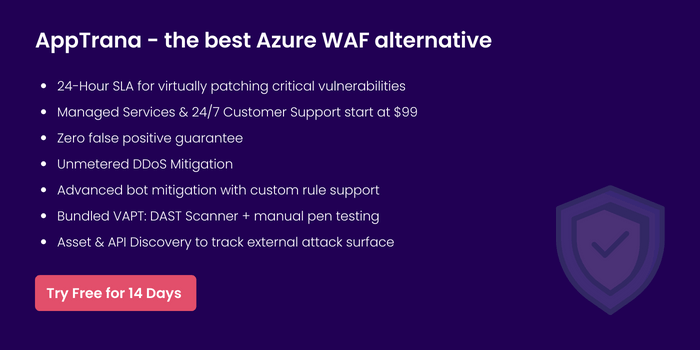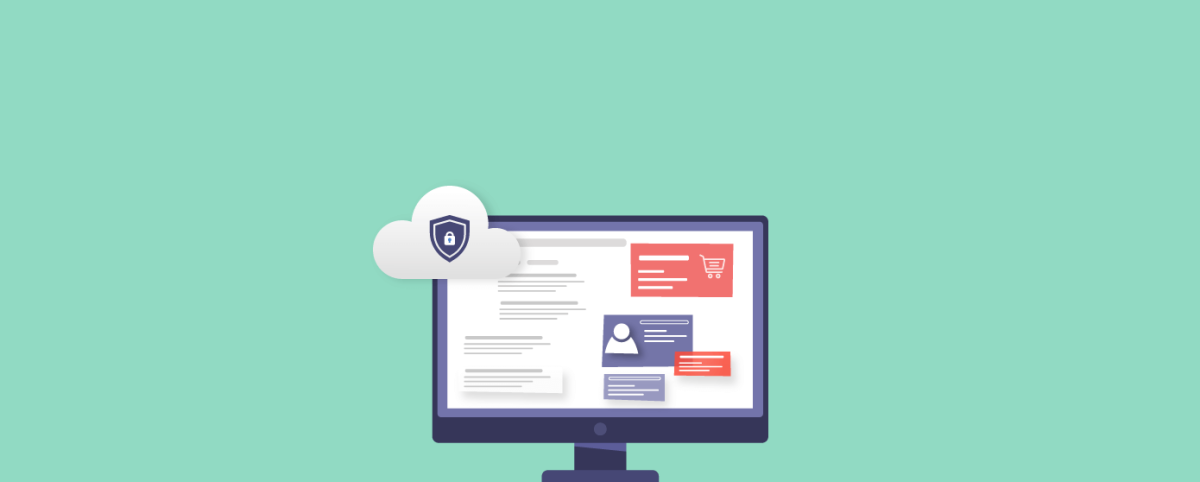Top Azure Alternatives for WAF in 2025
Azure WAF is a web application firewall offered by Microsoft, designed to protect web applications hosted on the Azure platform. This cloud-based solution integrates with various Azure services and offers centralized management and monitoring via the Azure portal.
Azure WAF’s tight integration with the Azure network infrastructure enables traffic to be directed to the WAF without additional DNS modifications.
In this blog, we’ll explore the top Azure alternatives in 2024, comparing their features to help you choose the best fit for your web application security needs.
Most Important Features of Azure WAF
Usage-based Pricing
Azure WAF offers a pay-as-you-go pricing model, ensuring you only pay for the resources you consume. Typically, Azure WAF is charged according to the data volume it processes. This flexible approach aligns costs with your utilization of the web application firewall.
Integration with other Azure Security Roles
Azure WAF seamlessly integrates with Microsoft’s suite of Azure security tools, including Azure Sentinel, a cutting-edge SIEM solution. Microsoft Sentinel empowers organizations to proactively detect complex threats, conduct in-depth investigations, and respond immediately to bolster their security posture.
Regulatory Compliance
Thanks to its flexibility, achieving compliance with the data privacy requirements is effortlessly attainable through Azure. Azure offers an extensive range of over 100 compliance certifications, including more than 50 customized to address the unique needs of various global regions and countries.
Azure Marketplace Rules
Azure WAF offers the flexibility to purchase rule sets from leading WAF providers, such as Fortinet and Barracuda, through the Azure marketplace, delivering more comprehensive protection. These externally sourced rules receive frequent updates, surpassing the default Azure WAF rules in this regard.
It is essential to be aware that adopting these rules incurs a fixed subscription fee and usage-based charges for the traffic they analyze.
Reasons Why You Might Need Azure WAF Alternatives
DDoS Protection is expensive
Azure DDoS Protection is a vital component of Azure security, defending the cloud infrastructure from disruptive cyber attacks. Despite its advanced features like logging, alerting, and telemetry, the high cost of Azure DDoS Protection makes it too expensive.
The DDoS protection plan is priced at $2,944 per month, covering up to 100 public IP addresses, with additional resources costing $29.50 per month each.
Bot Protection
If bot mitigation is one of your requirements from a WAAP, Azure may not be the best choice, as the bot mitigation capabilities available out-of-the-box are fairly basic. Also, bots have become advanced in that software needn’t be enough to block them.
Especially in slow DDoS attacks or complex brute force attacks carried out by botnets where traditional approaches such as rate limits are ineffective. That is when you need managed services to counter these attacks effectively, and Azure’s managed services are limited to DDoS attacks.
API Security
The capabilities of API security are limited. While effective against simple cyber threats, basic API security cannot safeguard against advanced and highly skilled attackers. Adopting a robust and multi-faceted API security approach that includes API discovery and a built-in API security scanner is crucial to provide thorough protection.
Limited Native Security Offerings
Like many other public cloud WAFs, Azure WAF serves as a basic checkbox for application security and may not provide complete protection against advanced threats. If your applications are hosted in diverse environments like multiple cloud platforms, on-premises, or hybrid setups, opting for a platform-agnostic WAF like AppTrana is recommended.
Fifteen Azure WAF Alternatives to Consider
- AppTrana
- Akamai
- Imperva
- Cloudflare
- Fastly
- Radware
- Barracuda
- F5
- ThreatX
- Fortiweb
- Palo Alto
- Google Cloud Armor
- Sucuri
- NAXSI
- ModSecurity(Open Source)
A Quick Snapshot Comparison for the Top 5 Alternatives
| WAF Feature | Azure WAF | AppTrana | Akamai | Imperva | Cloudflare | Fastly |
| Gartner Peer Insights Rating | 4.5 | 4.9 | 4.7 | 4.7 | 4.5 | 4.9 |
| Gartner Peer Insights Customer Recommendation Rating | 89% | 100% | 88% | 92% | 93% | 97% |
| DDoS Monitoring | $2900 per month | Available | Add-On | Add-On | Enterprise Only | Ultimate Plan only |
| Virtual Patching | Self-Service | Starts at $99 | Add-On | Add-On | Ultimate Plan only | Ultimate Plan only |
| Payload Inspection Size | 128KB | 134MB | Starts: 8KB
Max: 128KB |
Unknown | 128KB | Unknown |
| NTLM Support | Unknown | Yes | No | Unknown | No | Unknown |
| Bot Protection | Basic Protection | Yes | Add-On | Not available in essentials
Add-on in Professional Bundled in Enterprise Plan |
Yes | Yes, but unsure whether it is bundled in all plans |
| Response Timeout | Unknown | Default: 300 seconds
Max: 300 seconds |
Default: 120 seconds
Max: 599 seconds |
Default: 360 seconds
Max: Unknown |
Default: 100 seconds Enterprise: 6000 seconds |
Default: 60 seconds
Max: 300 Seconds |
| Managed Services / 24*7 SOC | Not Available | Available | Add-On | Add-On | Enterprise only | Ultimate Plan only |
| DAST Scanner | Not Available | Bundled in all plans | Not Available | Not Available | Not Available | Not Available |
| Malware Scanner | Not Available | Available | Available | Not Available | Available | Not Available |
| Asset Discovery | Not Available | Bundled in all plans | Not Available | Not Available | Not Available | Not Available |
| Penetration Testing | Not Available | Available | Not Available | Not Available | Not Available | Not Available |
| API discovery | Not Available | Available | Available | Available as an Add-On | Available | Available |
| API Security | Basic | Available | Available | Available | Available | Available |
| API Scanning | Not Available | Available | Not Available | Not Available | Not Available | Not Available |
| API Pen Testing | Not Available | Available | Not Available | Not Available | Not Available | Not Available |
| Workflow-based bot mitigation | Not Available | Available | Add-On | Add-On | Enterprise only | Ultimate Plan Only |
| Origin Protection | Available | Bundled in all plans | Add-on | Not Available | Limited | Add-on |
| SwyftComply | Not Available | Available | Not Available | Not Available | Not Available | Not Available |
| Client-side Protection | Not Available | Available | Available | Available | Available | Not Available |
| DNSSEC | Available | Available | Available | Available | Available | Not Available |
| Custom Error Page | Available | Available | Available | Available | Available | Available |
The Top Five Alternatives to Azure WAF: In-Depth Comparison
AppTrana
AppTrana WAF is unique for its rapid 24-hour virtual patching of critical vulnerabilities, guaranteed to have ZERO false positives. The only WAAP vendor that openly discusses and commits to this core belief: 100% of applications onboarded in block mode.
Top Features of AppTrana
SwyftComply
Meeting regulatory requirements demands a report free from vulnerabilities, yet addressing open vulnerabilities is hindered by dependencies on third-party components lacking immediate patches.
SwyftComply empowers AppTrana users to expedientlyautonomously remediate all the vulnerabilities produce aand generate a zero-vulnerability report within 72 hours, simplifying security audits. Key features include:
- Built-in DAST scanner for continuous vulnerability detection, malware scanning and identification of zero-day threats.
- Autonomous patching functionality to fortify against all open vulnerabilities on AppTrana WAAP.
- Clean, zero-vulnerability report downloadable within 72 hours via the portal.
Unmetered Behavioural-based DDoS monitoring
With AppTrana, you receive unmetered Behavioural DDoS Protection included in every plan, removing the need for additional charges.
Moreover, you won’t have to manually configure static rate limits, as AppTrana analyzes user behaviour and recommends rate limits at the IP, geographical, and URL levels. This approach significantly reduces the likelihood of false positives, a common issue when using host-based rate-limiting policies.
Request Inspection Size
By default, AppTrana permits request inspection sizes of up to 134MB. However, the request inspection size in the Azure environment is restricted to a more limited 128KB.
Asset and API Discovery & Bundled VAPT
AppTrana offers comprehensive asset discovery, providing a holistic view of your public web assets, such as domains, subdomains, IPs, mobile apps, data centers, and APIs. This functionality aids in compliance efforts like SOC 2, ISO 27001, and PCI by facilitating the management of external asset inventories.
Once assets are identified, they can be seamlessly integrated into the bundled DAST scanner, with the option to augment security through penetration testing add-ons, ensuring a thorough risk assessment for applications and APIs.
AppTrana provides managed services for virtual patches or custom rules to address identified risks. Asset discovery, API Discovery, and the DAST scanner are accessible across all plans, while penetration testing is included in the premium plan.
Now, coming to the limitations of AppTrana
No Option for On-premise WAAP
While AppTrana enables organizations to leverage the advantages of cloud-based security, including dynamic scalability and centralized management, it may not align with the preference of enterprises that place a premium on retaining their security infrastructure only within their own facilities.
No Legacy API Support
At present, API security measures do not encompass protection for legacy API standards like SOAP and WebSocket.
Akamai
Akamai was at the forefront of website protection against attacks and has become the world’s largest CDN provider. Its proficiency in CDN solutions has earned it significant popularity, especially in the media, gaming, and streaming industries.
Prolexic
Akamai’s cloud-based DDoS protection platform, Prolexic, is a robust barrier against potential attacks. It proactively intervenes to prevent these threats from reaching applications, data centers, or internet-facing infrastructure. The platform offers customers proactive mitigation under constant monitoring by Akamai’s round-the-clock global SOCC, guaranteeing an exceptional 100% uptime SLA.
Page Integrity Manager
With the increasing reliance on modern websites on multiple third-party sources executing scripts directly in user browsers, security teams encounter significant hurdles in overseeing and managing these external scripts. Akamai’s Page Integrity Manager, an in-browser cybersecurity offering, effectively tackles this challenge by quickly identifying suspicious script activities.
API Security
Akamai’s App & API Protector distinguishes itself through its automatic inspection of all API requests, eliminating the necessity for registration and providing instantaneous, robust API security upon implementation. Furthermore, it includes API Discovery functionality, which informs security teams about newly connected APIs, thereby fortifying protection.
If API security is one of the reasons you are looking for Azure alternatives, then Akamai WAF and AppTrana are the preferred choices.
Limitations of Akamai
Pricing
Akamai WAF tends to come with a higher price tag. Akamai is renowned for its enterprise-grade product offerings and top-tier features, which mirror their outstanding performance and reliability, rendering them a valuable investment, particularly when paired with managed services. Nevertheless, it may pose budget challenges for smaller organizations with limited resources.
Payload Inspection Size
Like Azure WAF, Akamai encounters restrictions when examining exceedingly large web request content. It enforces a maximum payload size limit of 128 KB, with the default configuration set at only 8 KB.
False Positive Management
Managing false positives can be equally challenging with Akamai as other leading WAAP providers. The WAF may unintentionally block legitimate users, requiring a manual examination. These challenges become especially apparent when your organization lacks certified in-house security professionals or hasn’t opted for the managed services add-on.
Imperva
Recognized as a leading player in the Gartner Magic Quadrant for Web Application Firewalls, Imperva is one of the highly adopted WAF solution providers. Imperva reports that 90% of WAAP deployments are in block mode.
Hybrid Deployment
For organizations embracing a hybrid WAAP strategy, Imperva offers a comprehensive suite of solutions to depend on. They can choose to deploy an on-premise WAF to protect sensitive user data stored in their local data center, all while taking advantage of the cloud-based WAF for increased scalability and agility.
RASP
At the core of Imperva’s top-tier application security solution, RASP (Runtime Application Self Protection) revolutionizes the concept of defense-in-depth. With its ability to offer insights at the application layer, RASP equips SOC teams to make faster, well-informed decisions and significantly reduces investigation time. The outcome is precise threat detection, all while minimizing the false positives.
Here are the limitations of Imperva WAF
Managed Service is Add-on
To utilize a managed WAF, you must select the managed services add-on.
AppTrana takes it further with its managed WAF, including DDoS monitoring, virtual patches, and thorough false-positive testing, all incorporated into the premium plan.
API Discovery as an Add-on
Adequate API security relies significantly on the initial API discovery stage, and opting for an additional charge for this functionality might not be the most efficient decision.
AppTrana and other WAAP providers already include API discovery in their standard pricing. Moreover, AppTrana’s licensing stands out by having penetration testing for API endpoints, offering a unique service that differentiates it from most other WAAP providers.
Cloudflare
Cloudflare empowers your business to provide exceptional user experiences by enhancing performance and offering top-notch application security, all within a seamlessly integrated and user-friendly platform.
DDoS Protection
While all WAAP providers include DDoS protection, Cloudflare is typically perceived as a high-end solution, which may be accompanied by a pricing structure that aligns with its advanced features.
Cloudflare boasts a notable track record of effectively countering some of the largest-scale DDoS attacks ever recorded, underscoring its ability to mitigate substantial threats. Much like AppTrana, Cloudflare’s DDoS protection is tailored to adapt to your specific traffic patterns, providing an elevated level of defense against sophisticated DDoS attacks.
Actionable Threat Intelligence
When considering threat intelligence options, Azure taps into the collective knowledge of over 3,500 cybersecurity experts worldwide, working together to protect your business assets and Azure data.
Cloudflare relies on its extensive global network to identify and neutralize more than 136 billion threats daily.
Both providers actively utilize their insights to reduce risk levels, showcasing the industry’s top-tier threat intelligence. Explore a detailed comparison of Cloudflare vs. Azure WAF.
Solution for SaaS
Cloudflare’s SaaS offerings encompass many features, including SSL certificate management, support for vanity domains, advanced Bot Mitigation, WAF rules, analytics, DDoS protection, and API security solutions. This makes it a well-rounded choice suitable for SaaS companies regardless of their size.
Cons of Cloudflare WAF
False Positive Monitoring
Security software must continuously evolve to address the dynamic threat landscape. While Cloudflare boasts world-class threat intelligence, it faces the task of formulating generic rules to cover the diverse array of applications on its network, often leading to false positives.
Managing these false positives can be daunting, especially for organizations without a dedicated team of security experts or those unwilling to invest in managed services, which can come at a monthly cost of several thousand dollars.
Request Inspection Size
Like Azure, Cloudflare also permits the inspection of requests with a maximum size of 128KB. Nevertheless, considering how easily a payload exceeding this size can be transmitted, this constraint may prove insufficient.
Fastly
Fastly stands out due to its remarkable success in preventing false positives, as about 90% of its clients choose the full blocking mode.
One key factor contributing to this accomplishment is Fastly’s exclusive SmartParse technology, which enhances anomaly detection without needing signatures.
Top Features of Fastly:
SmartParse
The core purpose of SmartParse is to enable quick decision-making during request assessment and identify potential malicious payloads through context and execution analysis. As a result, expanding protection becomes seamless, freeing you from the usual maintenance burdens associated with other WAFs.
Network Learning Exchange (NLX)
Fastly sets itself apart with the Network Learning Exchange (NLX), a valuable IP reputation feed derived from verified data on malicious activities gathered from Signal Sciences customers. NLX is proficient in identifying attack patterns across the customer network, enabling early warning alerts that help spot potential threats before they become malicious website activities.
Here are a few cons of Fastly WAF:
Rate limiting
This limitation could be a major concern for high-profile or large-scale resources. The availability of advanced rate limiting, essential for protecting against excessive traffic and misuse, is restricted to the Premier platform and specific package offerings. Regrettably, the Professional and Essential platforms do not include this feature.
If you’re looking for budget-friendly DDoS protection and API security options, Fastly may not be the ideal choice as an alternative to Azure WAF.
Managed Service
Suppose you’re looking for a managed WAF that provides features like virtual patches, DDoS monitoring, latency monitoring, and the flexibility to create custom workflow-based bot rules. In that case, you’ll need to select the Ultimate plan, as these services are not included in the Starter and Advantage plans.
Verdict
If you’re seeking a managed WAF on a limited budget, AppTrana stands as your only choice.
Cloudflare is a solid choice if you’re looking for an Azure alternative on a tight budget. As your needs expand, pricing differences between Cloudflare and larger WAAP providers like Akamai and Imperva become less pronounced. Starting a trial helps assess WAF compatibility with your application.
While reading about the top 5 Azure alternatives in this blog, be sure to check out our comprehensive analysis of 17 WAF (WAAP) providers on the market.
Stay tuned for more relevant and interesting security articles. Follow Indusface on Facebook, Twitter, and LinkedIn.


 March 13, 2025
March 13, 2025








